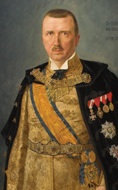|
Iván Skerlecz
 Baron Iván Skerlecz de Lomnicza (often rendered Ivan Škrlec Lomnički in Croatian; 20 July 1873 – 12 January 1951) was a Croatian ban (viceroy) between 21 July 1913, until 29 June 1917. Skerlecz was born in Oroszló, Baranya County, Kingdom of Hungary in 1873. He was born into Šokci origin aristocratic family. His father was Baron Károly Skerlecz de Lomnicza (1836–1901), high sheriff (főszolgabíró) of Baranya county, ministerial councilor; his mother was the noble lady Sarolta Hrabovszky de Hrabova (1850–1931). His paternal grandfather was Baron Károly Skerlecz de Lomnicza (1793–1863), royal chamberlain, who received the title of baron on 22 August 1857. His maternal grandparents were Baron János Hrabovszky (1777–1852), a major general and military commander of Croatia and Slavonia, and Izabella Klobusiczky (1824–1905) from Klobusic and Homorog."[1] The Skerlecz family had good relations with the Tisza family as early as the time of Prime Minister Kálmán Tisza. He studied law in Pécs and Budapest. From 1896, at the age of 23, he served in the public service as a drafting intern at the Prime Minister's Office. From 1911, he rose to the rank of ministerial advisor at the Prime Minister's Office.
He resigned from his post on June 29, 1917, after his political supporter Pm. István Tisza was ousted from power,[3][4] leaving the country in no better state than when he had arrived. The Kingdom of Serbs, Croats and Slovenes was formed the following year. Skerlecz became persona non grata in Kingdom of Yugoslavia, because he was known as an ardent opponent of the involvement of Croatia in the newly formed Kingdom of Yugoslavia. Skerlecz had to escape to Hungary where he died in Budapest in 1951. MarriageOn December 21, 1918, in Budapest, he married the divorced Baroness Lilly Amália Gutmann (1882–1954), the former wife of Baron Dr. Gyula Madarassy-Beck (1873-1939), whose parents were Baron Vilmos Gutmann (1847–1921), an industrialist, and Rozália Krausz (1859-1932). Since the marriage did not produce any children, and he was the last male member of his family, the Skerlecz family of Lomnica became extinct with him. References
Sources
|
||||||||||||||||||||||||||
